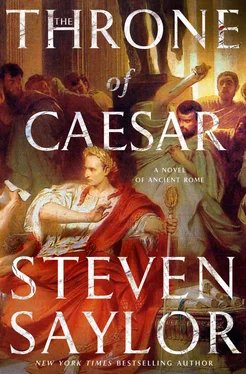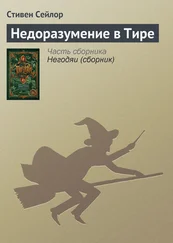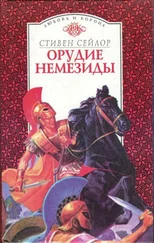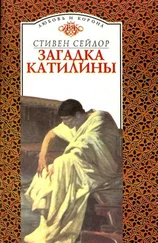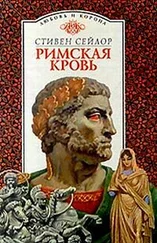Стивен Сейлор - The Throne of Caesar
Здесь есть возможность читать онлайн «Стивен Сейлор - The Throne of Caesar» весь текст электронной книги совершенно бесплатно (целиком полную версию без сокращений). В некоторых случаях можно слушать аудио, скачать через торрент в формате fb2 и присутствует краткое содержание. Год выпуска: 2018, Издательство: St. Martin's Press, Жанр: Исторический детектив, на английском языке. Описание произведения, (предисловие) а так же отзывы посетителей доступны на портале библиотеки ЛибКат.
- Название:The Throne of Caesar
- Автор:
- Издательство:St. Martin's Press
- Жанр:
- Год:2018
- ISBN:нет данных
- Рейтинг книги:5 / 5. Голосов: 1
-
Избранное:Добавить в избранное
- Отзывы:
-
Ваша оценка:
- 100
- 1
- 2
- 3
- 4
- 5
The Throne of Caesar: краткое содержание, описание и аннотация
Предлагаем к чтению аннотацию, описание, краткое содержание или предисловие (зависит от того, что написал сам автор книги «The Throne of Caesar»). Если вы не нашли необходимую информацию о книге — напишите в комментариях, мы постараемся отыскать её.
The Throne of Caesar — читать онлайн бесплатно полную книгу (весь текст) целиком
Ниже представлен текст книги, разбитый по страницам. Система сохранения места последней прочитанной страницы, позволяет с удобством читать онлайн бесплатно книгу «The Throne of Caesar», без необходимости каждый раз заново искать на чём Вы остановились. Поставьте закладку, и сможете в любой момент перейти на страницу, на которой закончили чтение.
Интервал:
Закладка:
Deep within the house, completely secluded from the street, was an unusually large garden. Pebble-strewn pathways were bordered by small trees and shrubs and decorated with bubbling fountains and elegant statues.
The most prominent of these, because it stood in the garden’s center and towered larger than life over everything else, was a bronze statue of Bacchus. The god of wine and ecstatic release was shown in his youthful guise, wearing long, loose robes. Grapes and vines adorned his long hair and framed his boyish, beardless face. In one hand he held an upright spear twined with ivy, in the other a cluster of grapes. But the most striking details were the silver horns that sprouted from his temples. Statues depicting Bacchus with horns were rare, at least in my experience. He was said to reveal his horns only at the moment his frenzied female worshippers, called Maenads or Bacchantes, were on the brink of the divine madness called bacchanalia.
“That wasn’t here the last time I visited,” I said to Cinna as we passed before the statue. “It wasn’t among Pompey’s decorations.”
“You’re right. The statue arrived with Fulvia. Ironic that she brought with her the god of wine but won’t allow Antony himself to play Bacchus.”
This was not the only change I noticed. When I had last been in the garden, there had been many dining couches piled with plump cushions set amid the little arbors of myrtle and cypress, elegant accommodations for the famously raucous parties held on warm summer evenings when Cytheris played hostess and Antony quite literally played Bacchus, with ivy wreathing his brow and an endlessly replenished cup of wine in his hand. Those days were over. There was much less furniture now, and what there was looked much less comfortable. The corner where Antony sat, attended by scribes on either side and with a table of scrolls before him, looked more like a magistrate’s office than a place for bacchanalia.
Antony was formally dressed in his consul’s toga hemmed with a thick red border. He was dictating to one of the scribes but stopped at our approach. His wide, ruggedly handsome face broke into a beaming smile at the sight of Cinna. He rose from his chair and the two embraced. I was struck by the contrast. Cinna was slender and classically handsome. Antony, with his craggy brow and dented nose, was slightly shorter but twice as broad.
“And here, Gordianus, let me embrace you as well!” This came as a surprise, but I awkwardly submitted to a hug that squeezed every bit of air from my lungs. Antony had the build of a boxer and the strength of one as well.
“Congratulations!” he said, releasing me from the hug but then gripping my shoulders as if he intended to crush them. In his enthusiasm he started shaking me. I clenched my teeth to keep them from rattling.
“Congratulations!” he said again, finally stepping back.
“But … for what, Consul?”
“Your appointment to the Senate, of course! Ah, Gordianus—always so cagey, even when receiving congratulations. Well, you’d better get used to it. Come the Ides, you will be inundated with words of welcome and praise.”
“I will?”
“Most certainly! Think how many men in the Senate owe you a debt of gratitude for getting them out of some scrape or other, or helping them find evidence to destroy some villain in the law courts. You’ve made many a friend over the years.”
“And many an enemy,” I said. “But how did you know of my appointment? I was hoping to give you the news myself.”
“These days, Gordianus, there’s very little that happens in Rome that I don’t know about. Part of my wife’s bride-gift was the network of spies she’s built over the years. Fulvia’s eyes and ears are everywhere. Everywhere! She makes the perfect consul’s wife.”
He reached for Fulvia, pulled her close, and gave her a kiss. She might have succeeded in making Antony a sober, hardworking magistrate, but staid he would never be. She accepted the kiss with an enthusiasm that surprised me, considering that three visitors and two scribes were present. The moment was rather touching, for there could be no doubt that their affection was genuine. Fulvia had finally found the mate she deserved. So, perhaps, had Antony.
The kiss ended, but Antony held Fulvia close. “And congratulations to you as well, my dear Gaius,” said Antony.
“My life is so replete with accomplishments, I’m not sure for which of them you congratulate me,” said Cinna .
“For completing the new poem, you lout—and just in time for Caesar to read it before leaving for Parthia. Now that’s writing to deadline! I have no doubt he shall love it as much as I do.”
I looked sidelong at Cinna. “I thought Caesar was the first reader.”
“Indeed he is—the first reader of the complete poem,” said Antony. “But I’ve been privileged to hear bits and pieces of it over the years.”
I raised an eyebrow. “Cinna told me he never recites from his work before it’s published.”
Cinna looked a bit chagrined. “Antony is the only exception to the rule.”
“And what a lucky man that makes me!” said Antony. “Magnificent stuff, this new poem! The stories of both Orpheus and Pentheus are told, side by side, so to speak. Your description of the beheading of each is the stuff of nightmares. I shiver, remembering those lines. ‘Then did his mother lift up the sundered head, and kiss her son upon the mouth, and thought she felt him draw a shuddering breath—the passage of a breeze across the blood-wet emptiness of his severed throat.’ By Jupiter, Gaius, it’s as if you were actually there to witness such a thing.”
I felt a chill down my spine. Once I had seen a man beheaded—Pompey, on the beach in Egypt, at a great distance, to be sure. That moment still haunted my dreams. I glanced at Fulvia, who had by slow degrees withdrawn from her husband’s encircling arm, and I saw her turn pale. She, too, must have been thinking of a real beheading, that of her husband Curio at the hands of Juba’s soldiers in Africa.
Looking at me and then at Fulvia, Antony realized the impact of his words and drew a sharp breath. “But the poem is about much more than that, of course.…”
“Indeed it is,” said Cinna quietly. I saw that Fulvia was staring at him with a strange, fixed gaze, as if to accuse Cinna of some impropriety simply for having written such words—words intended, I had no doubt, not merely to shock but also to evoke the terror and pity that Aristotle held to be the highest accomplishment of art.
“I think we must have some wine,” said Antony. Fulvia shot him a piercing look. “But we must, my love. It isn’t every day that a fellow gets made a senator, or finishes an epic, and here we have a chance to celebrate both!”
“Very well.” Fulvia clapped to summon a slave and ordered that special cups be brought, along with a pitcher of Falernian. “Your favorite, as I recall,” she said to Cinna.
“Indeed it is.”
Fulvia turned to me. “I understand from your wife that those two slave boys I gave you are now down on the Cup, pestering your son instead of you.” Her interest in the matter was surely slight, I thought, but the question served to change the subject.
“Yes. But Mopsus and Androcles are hardly boys anymore. They’ve shot up like weeds in the last year or two.”
“They must be thriving, then. I’m glad. I do have fond memories of them.”
Did she really? It was sometimes easy for me to forget, when dealing with persons of her stature, that Fulvia was a woman like any other, capable of feeing genuine affection for her inferiors—as long as they didn’t cross her. Mopsus and Androcles had assisted me when I looked into the matter of Clodius’s murder, and afterward Fulvia made a gift of them. Had they remained in her household, I had to think it likely that they would have come to grief, given their penchant for getting into mischief. It was hard to imagine the woman who gave orders to Antony granting leniency to a slave.
Читать дальшеИнтервал:
Закладка:
Похожие книги на «The Throne of Caesar»
Представляем Вашему вниманию похожие книги на «The Throne of Caesar» списком для выбора. Мы отобрали схожую по названию и смыслу литературу в надежде предоставить читателям больше вариантов отыскать новые, интересные, ещё непрочитанные произведения.
Обсуждение, отзывы о книге «The Throne of Caesar» и просто собственные мнения читателей. Оставьте ваши комментарии, напишите, что Вы думаете о произведении, его смысле или главных героях. Укажите что конкретно понравилось, а что нет, и почему Вы так считаете.
